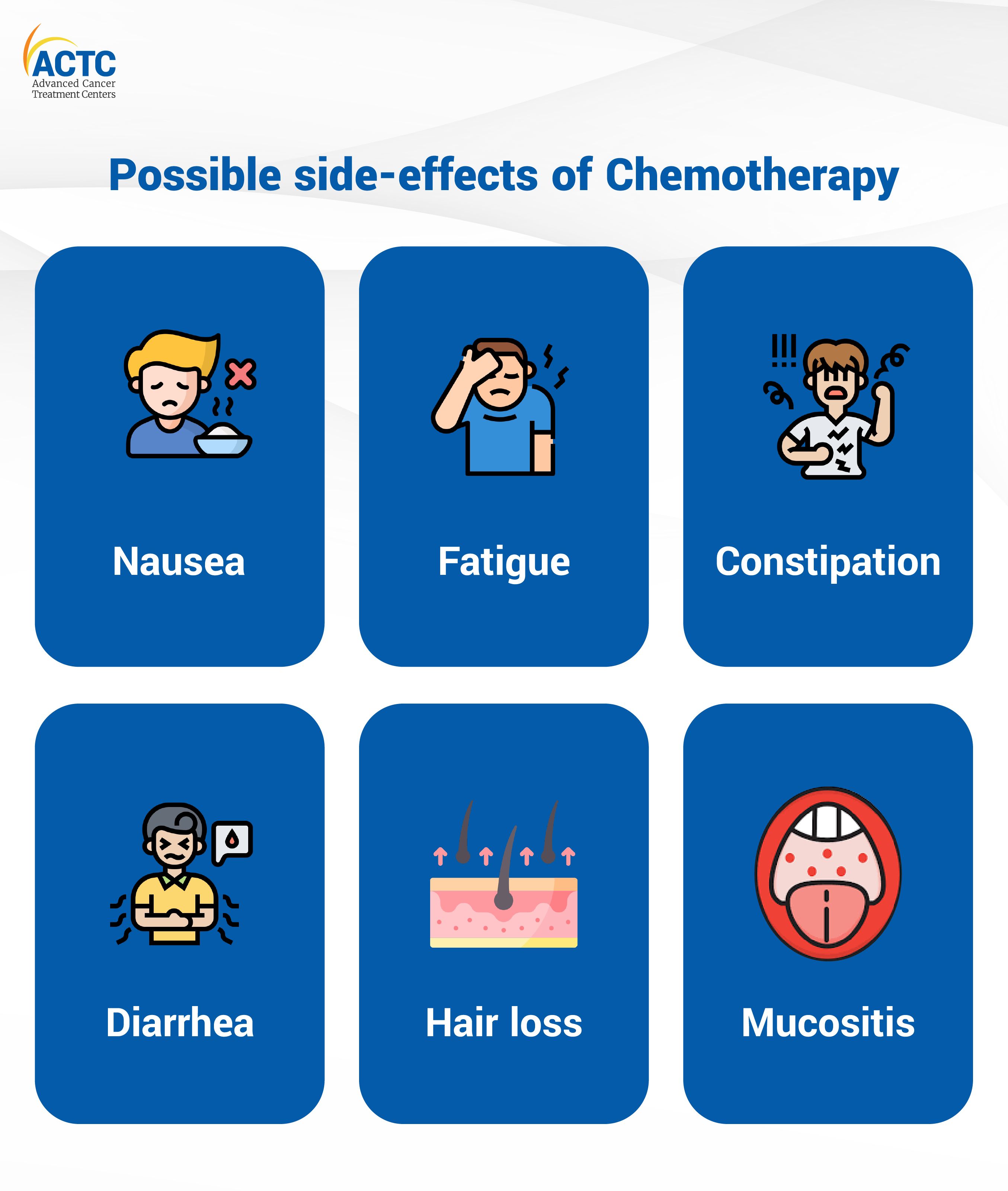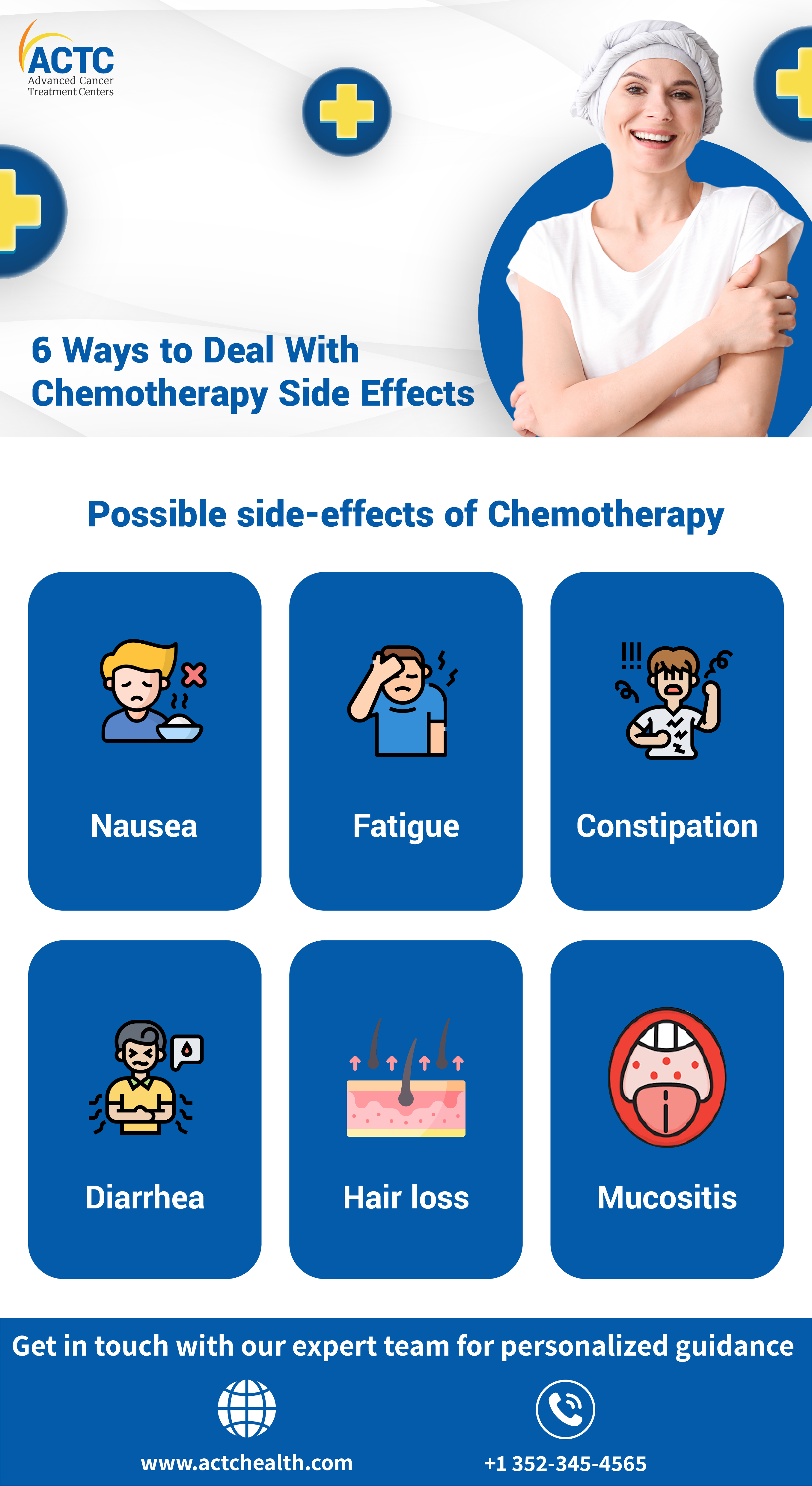
Book a Consultation
Thank you!
Your form has been sent successfully.



September 16, 2022
Chemotherapy is most frequently used to treat cancer because cancer cells multiply and develop considerably more quickly than the majority of body cells. Chemotherapy is a treatment protocol that uses potent chemicals to kill your body's rapidly proliferating cells. Chemotherapy treatment is typically used in combination with other treatments like hormone therapy and radiation therapy. It is a systemic treatment, meaning that it affects the entire body.
Cancer cells can be effectively attacked by chemotherapy, but there are some side effects of this treatment that can negatively affect your quality of life. Fortunately, as research on cancer has increased, so has knowledge of how to control and lessen the side effects of chemotherapy. The most common chemo side effects are listed below, along with remedies that can help patients feel better.

When you are fatigued, you feel unusually weak, exhausted, and devoid of energy. Post chemotherapy treatment fatigue may begin abruptly or develop gradually over time.
How to manage
To maintain energy levels, try to be active. Take a walk outside or on a treadmill. Patients who engage in mild exercises, such as walking, feel less worn out and are better able to endure chemotherapy.
Take breaks and rest whenever exhausted. Go for quick cat naps that may last 15 to 20 minutes. Daytime fatigue will be lessened if shorter naps are taken and the quality of sleep at night will be better.
Consume plenty of liquids. Every day, consume 8 to 10 glasses (8-ounce) of non-caffeinated beverages. The best options are water, juices diluted (combined) with water or electrolyte-containing liquids.
Get in touch with the doctor if you experience any of the following:
Increased shortness of breath during minimal exertion or activity
A feeling of persistent anxiety and nervousness
Extreme dizziness
Chemotherapy can make you feel nauseated and cause you to throw up. This is because chemotherapy irritates your brain's mechanisms that control nausea and the cells that line your mouth, throat, stomach, and intestines.
How to cope
Follow the doctor's instructions thoroughly when taking anti-nausea medicine.
Avoid drinking anything that contains caffeine (such as coffee, tea, and soda).
Have small meals often. Eat less fatty and fried foods
Get in touch with the doctor if you experience any of the following:
Vomiting three to five times a day
Continued nausea despite medication
Unable to hold solids or liquids down
Feeling faint or woozy
Heartburn or stomach pain
Constipation occurs when you have fewer bowel movements than is normal for you, hard bowel movements, or difficulty going to the bathroom, or all three of these. It's a common adverse effect of drugs used to alleviate nausea and pain.
How to cope
Eat plenty of fiber-rich meals. Fiber can be found in fruits, vegetables, whole grains, prunes, and prune juice
Do light exercises or go for a walk if you can
Stay hydrated--Drink 8 ounces of water a day
Get in touch with the doctor if you experience any of the following
Having no bowel movement for more than two to three days
Having difficulty passing stool for more than two to three days
Gas and flatulence in stomach for more than two to three days
The side effects of chemotherapy also include diarrhea, which can sometimes last long after the treatment is completed. The chemotherapy treatment might also cause you to experience abdominal pain/cramps and problems with your bowel movements.
How to cope
Chemotherapy may temporarily make patients lactose intolerant. The use of milk or milk products may cause diarrhea or loose stools. You may want to reduce or eliminate these products until your diarrhea is controlled.
Take a break from laxatives and stool softeners for at least 12 hours
Avoid spicy, high-fat, high-fiber foods, and caffeinated drinks
Eat your food when it is at room temperature
A BRATY diet is recommended. Bananas (B), rice (R), applesauce (A), white toast (T), and yogurt (Y) are healthy choices
Get in touch with the doctor if you experience any of the following
Loose and watery stools (more than 4 times in 24 hours) persisting despite medication
Extreme stomach pain
Chronic irritation of the anus or rectum
Blood in stool
Hair loss often begins 2 to 4 weeks after your first chemotherapy treatment. Your hair will start to regrow within a few months after your last treatment. Your hair may grow back with a new texture or color.
How to cope
Wash and condition your hair every two to four days. Use a hair conditioner or cream rinse along with a baby shampoo or any mild shampoo.
To protect the scalp from sun damage, use shampoos and conditioners that contain sunscreen.
When going outside, wear a headcover.
Wear a hat, scarf, turban, or wig to keep your head warm during the winter. It will also help contain shedding hair.
Use silk or satin pillowcases
Get in touch with the doctor in the following scenario
You want to get your hair colored or permed or treated
Mucositis is characterized by redness, swelling, discomfort, or ulcers on the lips, tongue, or gums. The symptoms will usually appear after 3 to 10 days of your first chemo session.
How to cope
Rinse your mouth every 4 to 6 hours, or more frequently, if necessary. Use alcohol free mouthwash or create your own mix. Dissolve 1 to 2 tablespoons of salt in 1 quart (4 cups) of water to create your own home-made mouthwash.
Use a soft toothbrush for your teeth and gums.
Avoid eating anything hot, acidic, salty, or sour.
Quit smoking or using tobacco products.
Use lip balm to keep your lips hydrated.
Get in touch with the doctor if you experience any of the following
Your mouth sores persist
Have difficulty in swallowing or eating
Cannot consume enough liquids to stay hydrated
Read More: 5 Side Effects of Nicotine Gum
Each person's reaction to chemo treatment is different. You may or may not experience some or all of these side effects. Only you can be aware of what you are going through. Ensure you communicate your doubts and fears to your nurse, physician assistant, or doctor so that they can act quickly on those and make you feel better.
If you are looking for a cancer care team in Florida that includes chemo specialists, offers personalized care, and has an efficient working system in place, visit ACTC. Schedule an appointment with our expert team today.



January 07, 2026
A chemo port is a small device placed under your skin that makes recei...
KNOW MORE

December 24, 2025
It's natural to wonder if testosterone replacement therapy (TRT) is sa...
KNOW MORE

December 24, 2025
A rash that will not calm down is scary, especially when it changes or...
KNOW MORE

December 24, 2025
Florida’s lung cancer burden remains significant and affects many fa...
KNOW MORE

December 24, 2025
A partial hysterectomy, also called a supracervical hysterectomy, is s...
KNOW MORE

December 24, 2025
Finding a rash on your breast can be unsettling, but remember, many ra...
KNOW MORE
